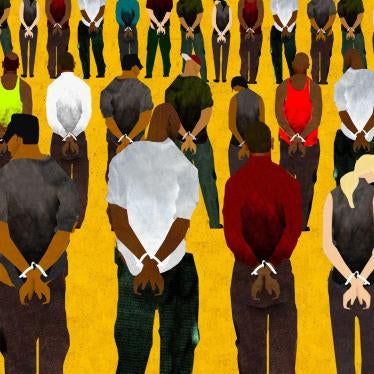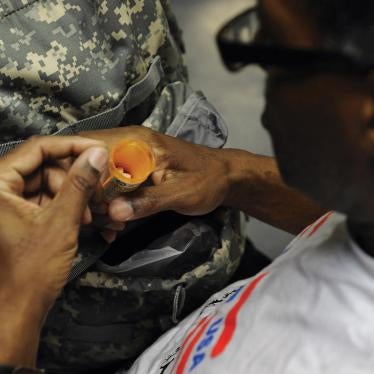An ordinance creating a syringe exchange program in Atlantic City, New Jersey provides an example of leadership in the fight against HIV/AIDS. Human Rights Watch urges other municipalities of the State of New Jersey to take similar measures to guarantee injection drug users access to sterile syringes.
HIV/AIDS is a preventable disease that has been turned into a devastating epidemic partly by policies that violate the human rights of those most at risk of infection. Outside of sub-Saharan Africa, an estimated one third of HIV infections can be traced to the sharing of blood-contaminated syringes by injection drug users. These infections are a predictable result of policies that favor mass arrest and incarceration of injection drug users over disease prevention and humane treatment for drug addiction.
Restrictions on sterile syringe access programs are a particularly lethal aspect of drug policy in some states and countries. Needle exchange has been demonstrated in numerous countries and U.S. states to reduce transmission of HIV and hepatitis B and C without increasing drug use. It is considered an international “best practice” in HIV prevention by United Nations agencies, and its public health value has been validated by numerous U.S. public health bodies, including the New Jersey Governor’s Advisory Council on AIDS. The popular misrepresentation of needle exchange programs as “condoning” drug use flies in the face of public health and amounts to an effective death sentence for people who suffer from the chronic illness of drug addiction.
In its restrictive approach to sterile syringe programs, New Jersey stands as an unfortunate model of ineffective—and cost-ineffective—practices in HIV prevention. Injection drug use accounts for an estimated 50 percent of HIV infections and 60 percent of hepatitis C infections in the state. The estimated lifetime cost of care for HIV/AIDS is $195,000, and for hepatitis C it is $100,000. Yet New Jersey is one of five states in the United States to require a prescription to purchase a sterile syringe, a requirement that does not exist in any other country of which we are aware. The state is one of two in the United States, along with California, to have convicted a syringe exchange worker on drug paraphernalia charges. The burden of these cost-ineffective drug policies is likely to fall on local health services.
Human Rights Watch is aware that municipalities in New Jersey that establish local syringe exchange programs face a possible legal challenge by state prosecutors. We oppose such legal action and call on the state government to lift any legal barriers to the establishment of syringe exchange programs at the local level. In the meantime, we applaud the courage and leadership of municipalities, such as Camden and Atlantic City, which have pursued local needle exchange programs in the face of threats of legal action.
Human Rights Watch urges all elected officials in New Jersey to respect drug users’ internationally recognized human right to the highest attainable standard of health by taking immediate and concrete steps to lift any and all restrictions on sterile syringe access programs.







